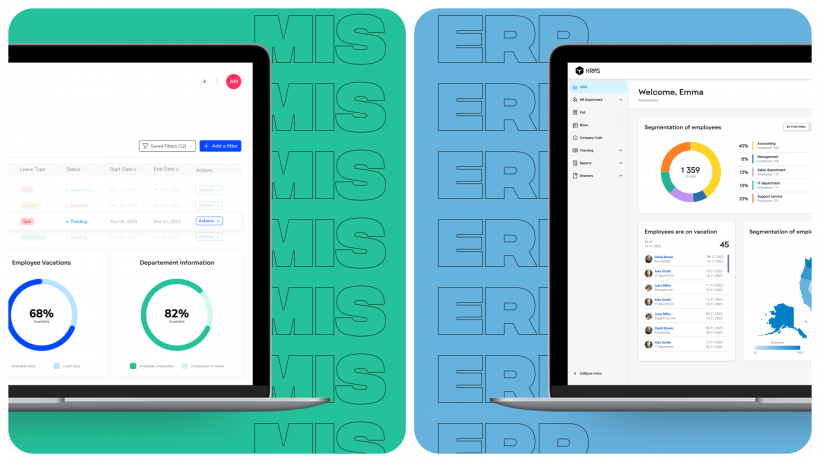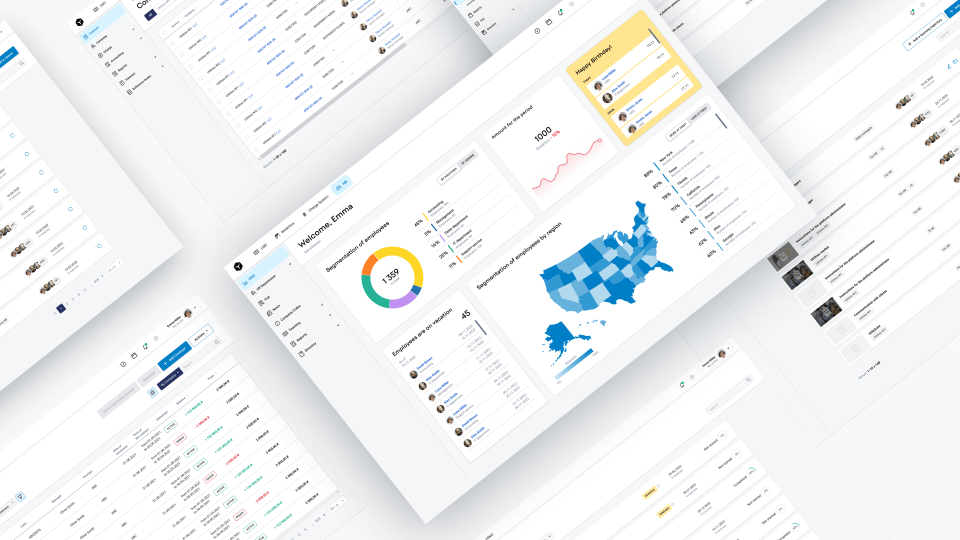Operations automation and data centralization are the two cornerstones on which the success of any business that scales stands as they help them to choose the right direction to manage existing resources and distribute them properly in the future. MIS and ERP systems play an important role in solving these problems.
However, what is the difference between them? Do they need to be deployed simultaneously or are they interchangeable? Let's figure it out.
What Is an MIS?
In a nutshell, MIS (Management Information System) is a centralized database that stores information about the company’s financial transactions, employees, and work processes.
The implementation of such a system is usually explained by the need for end-to-end analytics, control, and reporting across departments, as well as the processing and sharing of corporate data for better decision making. A distinctive feature of this software is its easy adaptation to the processes of a specific niche, which greatly increases the overall business efficiency.
Pros and Cons of MIS
The core advantages of such systems are the following:
- Data centralization. With consolidated data storage and extensive data standardization capabilities, departmental managers can instantly get the real-time insights they need.
- Task prioritization. Based on data analysis, department heads can identify bottlenecks in current business operations and eliminate them in time through proper prioritization.
- Improving the quality of business decisions. Thanks to rich analytics and reporting tools available in an average management information system, companies can make informed decisions on financial management, employee workload, partnerships, etc.
- Monitoring employee performance. Such systems allow heads to evaluate the performance of both departments and individual employees to promptly eliminate problems that slow down the work process.
- Document digitalization. Instead of using paper documentation, companies can go digital and thereby minimize the risks associated with using outdated data.
- A comprehensive view of the company's financial status. Such systems provide management with an end-to-end understanding of the company's financial status to help with planning its future development strategy.
- Strengthening competitive advantage. By automating multiple work tasks, MIS implementation can provide companies with a strong competitive advantage by delivering services/products to customers faster than ever before.
MIS applications also have several disadvantages:
- High cost of implementation and support. Regardless of whether you are going to use a ready-made solution or create a custom one from scratch, in the first case, your costs will constantly increase every month, and in the second, you will have to allocate a significant budget for development services. Also, do not forget that deploying the system will require additional expenses.
- High entry threshold for some employees. They are quite difficult to master, so you risk facing rejection of the new software by your individual employees.
We would like to highlight one more problem associated with ready-made solutions – despite the large number of functions that leading products often have, they may still not be flexible enough for your company. Therefore, the choice in favor of custom development for this type of software is quite predictable.
Fields of MIS Application
The most relevant use of management information system software is for the accounting, marketing, strategic planning, sales, and production departments. If we look at the need for implementation from a more global point of view, the introduction of such systems will benefit any company that needs centralized access to its corporate data and advanced tools for automated data processing.

What Does ERP Stand for?
ERP (Enterprise Resource Planning) software covers digital systems with more narrowly focused functionality compared to MIS systems. In particular, they are aimed at automating and optimizing business processes taking into account available resources. Often, ERPs are not used independently and become parts of more comprehensive systems. This is because they are not able to identify weaknesses in the company’s processes.
At the same time, ERP systems can benefit the accounting departments (in payment and debt management, budget planning, tax calculation, etc.), HR (in selection, training, payroll, etc.), production (in planning the purchase of raw materials, calculating the cost of products, etc.), marketing and sales (in dynamic pricing, order processing, as well as general sales analytics), logistics (in purchasing planning, cost calculation, invoicing, etc.), and so on.
Advantages and Disadvantages of ERP vs Traditional Information System
Now, let's look at the main advantages of ERP systems:
- Simplified reporting. Typically, ERPs provide their users with dozens of customizable templates that simplify the reporting procedure, ensuring a uniform format for reports. Also, these tools automatically upload real-time data, which means that the accuracy of these reports increases.
- Increased workflow efficiency. Thanks to built-in automation tools, such systems relieve company employees from a number of time-consuming repetitive tasks, thereby freeing up their resources for more interesting ones. Additionally, this is facilitated by providing quick access to the necessary corporate data, which ultimately has a positive effect on the quality of decisions made.
- Strengthened corporate data security. Because ERP systems store data centrally, this reduces the overall number of system vulnerabilities, which could potentially make a positive impact in ensuring compliance with industry standards.
- Improved quality of customer service. By increasing the speed of order processing and regular updates of customer data, the quality of customer service is significantly improved.
- New prospects for growth. The automation provided by ERP systems facilitates rapid and easy business scaling without compromising the quality of services provided.
Now a few words about the disadvantages:
- High implementation and support costs. Purchasing a license for a ready-made ERP system is usually a significant minus from the company’s budget on a monthly basis. As the functionality of the solution you purchase increases (especially if it needs to be customized), the cost of its license will also rise and, over several years of active use, you will most likely see a five-figure sum. Developing a custom solution will save you from regular payments for prolonging the ability to use it, but, at the same time, you will need to initially pay for development services. And, of course, do not forget that in both cases, you will also need to hire specialists who will implement, configure, and integrate the system with other software solutions that are used in your company.
Ultimately, the cost issue is inevitable, so before implementing an ERP solution, be it off-the-shelf or custom, you will have to first evaluate the potential benefits of using it to understand whether it will be cost-effective at all.
Fields of ERP Application
ERP systems are actively used in companies providing services in the fields of trade (offline and online), logistics and transportation, manufacturing, IT, real estate, etc.

Our Experience in the Development of ERP Systems
Now, let's consider the case of custom development of an ERP system, in which we were directly involved.
Not long ago, we were approached by a client representing an oil and gas company with seventeen offices. Due to the dispersed structure of the client’s business, as well as the negative experience of using off-the-shelf software solutions that were unable to fully cover the company’s business operations, the client decided to create a custom product completely tailored to them.
After a joint discussion of the client’s problems and goals, we were assigned the following tasks:
- Custom development of a comprehensive software solution, which would be presented in the form of four mutually integrated modules: an HRMS platform (for the HR department), a document flow system (for the accounting department), a billing CMS (also for the accounting department), an LMS mobile application (for training new employees and professional growth of existing ones)
- Ensuring compliance with industry standards for enterprise data security (ISO 31001, ISO 27001, GDPR, and CCPA)
- Integration with a number of applications and systems that the client’s company has already used
Based on these tasks, we settled on the following technology stack:
- Elasticsearch
- Redis (cache/queue)
- Java 11+
- Spring
- GraphQL
- Message broker (RabbitMQ|Nats)
- API Gateway (Spring Gateway|Appolo GraphQL Federation|Tyk)
- PostgreSQL
As for third-party integrations via API, they are concerned with the following services:
- Internal Revenue Service (IRS)
- DocuSign
- QuickBooks
- FedEx
As a result, the MVP was completed and launched after 30 sprints. Currently, we are involved in expanding its functionality while the client’s company (in particular, 1,500+ employees) uses its first version so far. Among the first positive results of this implementation is a debtors’ debt reduction of 38%.
What Should I Choose and Should I Choose?
Now, after our MIS vs ERP comparison, you can make an informed choice in favor of one or another software solution. If you still have any doubts, here are some additional insights:
- MIS is the optimal choice for companies that generally need to consolidate and control their corporate data that comes from disparate sources. Using this software, you can transform it easily into reports
- ERP systems will be helpful in planning resources and, as a result, business processes that use them. They provide solutions to more narrowly focused problems faced by specific departments of the company
At the same time, whether you settled on one of these two types of software, or decided to implement both, you should be prepared for the fact that none of the ready-made solutions considered may meet your individual business needs. In this case, we are always ready to come to your aid as a company with extended expertise in custom development of enterprise systems for niche use. Feel free to contact us right now, and we provide you with a free consultation.


